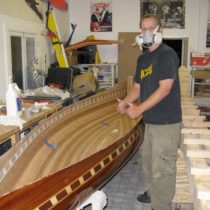Landscape Architecture for Landscape Architects › Forums › GENERAL DISCUSSION › A Peek at the State of the Oil Peak
- This topic has 1 reply, 6 voices, and was last updated 16 years, 1 month ago by
 nca.
nca.
-
AuthorPosts
-
November 5, 2009 at 10:37 pm #172416
 Mark WarrinerParticipant
Mark WarrinerParticipant“Urging the world to brace for a “really big reshuffle” in energy expectations, Christophe de Margerie, CEO of French energy giant Total SA, said he expected oil production to plateau in just 12 years at 94 million barrels a day — less then 10 million barrels more than available now. And he warned the forecast was optimistic.”
“We will have to fight against the natural decline of (present) oil fields,” he told the same forum Khelil attended. “It will not go smoothly.”The US, its economy, its infrastructure, its cities, towns and countryside have all been built on the concept of an endless supply of cheap or at least affordable oil. Our whole transportation system, the way we get goods and services to communities and the way communities function (police, fire protection, schools, etc) will have to be retrofitted because we will no long be able to pay the cost of the gas to keep them going.
Most people believe the end of the Oil Age is coming but we disagree on when and how hard a landing it’s going to be. Most people think we should have started getting ready in the seventies. Hubbert’s Oil Peak Theory predicted the US oil peak in the late fifties…. Considering the job we have ahead of us and the possible window of opportunity, the 50’s is when we should have started. We now have limited time and we are still even dickering about whether to even be worried. The idea that we are a great country will be tested in the next 50 years. What would the Great Generation do in this situation?
——————————————————————————–
Proposed 50-Year Energy Plan (a work in progress)
The price of oil in the near future will force us to abandon the far flung logistics that our economy is based on. Long distance trucking will become unprofitable. Everything that depends on nation-wide commerce will have to make other arrangements. A complete restructuring of our infrastructure, centering around localized living and all that it entails, will have to be our new system. We have to start on it today. Voltaire said “tend thy own garden”. We all should take a long look at our local communties and get ready to be more self-sustainable. Look at how or communties funtion. Our individual states need to make energy the priority. On the federal level energy research should be the number one concern. Suspend the space exploration and channel all these funds into solving the the comming oil peak problem.
Alternative Energy
Local:
Once localized energy programs (such as hydropower) will have to be used again. Other areas will need to investigate the best types of alternative power for each particular area, i.e., wind, wave and thermal. All local waste needs to be used as a fuel.
State:
All states need to start algae harvesting programs for oil. All states need to build nuclear plants.
Regional:
Regions that are mountainous: hydro power, flat regions wind, costal regions and the great lakes: wave motion.
National:
Ramp-up efforts in nuclear fusion.Architecture
All building construction needs to be sustainable and energy efficient. All roofs need to be green or solar. Building codes will have to rely on the sustainable, passive energy efficient techniques that have been developed over the past 3000 years.Community Planning
We have to organize our communities better. Our communities should no longer be dependant on the personal vehicle but have the versatility to encompass different ways of getting around. In other words, living should not depend on using large amounts of gasoline. Communities should be arranged where work is closer and where doing errands are close enough not to requiring a personal vehicle. Get back to depending on local crops for food. The farmers market is key.We have to stop building new roads…all new transportation construction and budgets need to be allocated for mass transit. Multi-modal systems will need to be a requirement in all major population areas, highly integrating long distance high speed trains, light rail, bus, vehicular, bike and pedestrians access.Food
All cities need to develop a diverse agricultural belt with large systems of farmers markets throughout the communities.Schedule
This massive undertaking will have to start today. Moblization should rival the efforts of WWII.November 6, 2009 at 4:42 am #172429 ncaParticipant
ncaParticipant‘Most people believe the end of the Oil Age is coming but we disagree on when and how hard a landing it’s going to be.’
The key from my perspective is the transition. If development continues to happen as it is today with little regard for what we all agree is pending I think we’d be pretty unwise not to begin developing new models today. In fact, it’s already happening. Eventually, what we consider fringe today will be typical tomorrow. Your vehicle may have enough fuel to get you to work, but do you have enough to get home?
In my mind, we’re better off familiarizing ourselves with the issue and preparing for it rather than be relinquished to obsolescence.
November 6, 2009 at 12:37 pm #172428 Trace OneParticipant
Trace OneParticipantI think this is asking us to use our brains, and understand that despite the economy not charging us a lot of money for oil (europe pays three times as much..) we as humans can understand that the economy is not counting all the cost of oil use. The true cost of oil turns out to be the collapse of existing ecosystems..What is the price of that? Or if you need it to be more direct, the cost of oil, where I live is some of the worst pollution in the country, and my collegues children growing up with asthma and early death….But for our children, we can think outside of the current limits of economic pricing, and try to behave in a responsible and intelligent manner. You are right, it is not easy finding work in sustainablilty, although I do see a lot of jobs advertised. But if current economic pricing is all you are using to detemine ‘cost’, I think you are missing out on 99%of the reason for acting..
November 6, 2009 at 3:41 pm #172427 Mark WarrinerParticipant
Mark WarrinerParticipant“But, to anounce that the rest of us are in control of our clients and are empowered to add green roofs and solar panels is either completely naive or very pretentious.”
I was refering to building codes.
November 6, 2009 at 6:18 pm #172426 Trace OneParticipant
Trace OneParticipantFor now, and for a long time to come, Jennifer, WE are almost the biggest polluter on the planet…end of story. However, I do agree with you that the sooner we can get our selves away from our wasteful ways, the sooner we can help the developing worlds develop in sustainable fashion..
I personally think conservation can go most of the way towards solving energy problems..You should see how they treat water in Fresno, which is classified as a steppe, 10″ of rain a year..everything is irrigated to the nines..
For that matter, all we need to do is impose a 55mph speed limit on all highways..the stroke of a pen..millions of gallons of gas n ot burned into the air..
November 6, 2009 at 8:30 pm #172425 Roland BeinertParticipant
Roland BeinertParticipantIt sounds like there’s more we can achieve as a group (ASLA) on this issue than as individual landscape architects.
The argument that nothing can be done until the price of oil goes up worries me a bit. I’m not sure people who use that argument realise the scale of the problem. None of the alternative power sources will ever equal oil in terms of the ratio of energy used to produce it : the energy it produces itself. So, ironically, the easiest and quickest way to build new non-fossil fuel power sources is actually to use oil. If we wait till the price of oil goes up, we will be faced with a much larger effort and expense than if we build them now. Can you imagine how hard it would be to build a huge array of solar panels or nuclear power plant without fossil fuels?
If you want a metaphor for this, it’s not really the same as preparing for work the next day like Andrew suggests. It’s more like preparing for a huge trip. You purchase your tickets several weeks or months in advance. Otherwise it is prohibitively expensive.
If you want to keep something like our current quality of life, we should get started now. If you want to live in a cave or live out a Mad Max fantasy, we can just relax and let this go till oil is scarce and expensive or wait around for technology to save us somehow.November 6, 2009 at 11:31 pm #172424 BoilerplaterParticipant
BoilerplaterParticipantIts good to see LA’s at least talking about this, as most seem to have their heads in the sand about it, IMO. As a profession we are supposed to be skilled at imagining future scenarios and designing for long-term conditions. That should necessitate keeping abreast of possible conditions that could impact a place in the future. But the way the financing for building is set up does not allow for that. There is just a limited set of givens you are designing for.
In the last few years I’ve done a lot of reading on the subject, like Al Gore’s book, Global Warning by Paul Brown, Collapse by Jared Diamond, The Long Emergency by Kunstler, Suburban Nation by Duany, Plater Zyberk & Speck and The End of Oil by Paul Roberts. A good documentary movie is The End of Suburbia. What I took from Collapse is that it is very easy for a society to fall into a pattern that endangers its future without its realization. Through The End of Oil it became apparent that there are massive externalities in fossil fuel production that are not being paid for, besides enormous subsidies for oil and gas production. Practical hydrogen cars are still a long way off. The oil industry has wielded formidable powering in stifling renewables. Most European countries are way ahead of us in creating incentives for alternative energy.
That being said, I think the reality that the suburban milieu that is the backdrop for most American lives now comes with a huge carbon footprint is too bitter a pill to swallow for most and has to be spoon-fed to them gently or else they tune out entirely. In community planning, elitist and exclusionary values still seem to be the primary dictators of the form the product takes, though I’m starting to see some developers bringing more energy-efficient homes to market. The homes themselves still try to fit into a certain standard type and even make a point of not looking “different” as many perceive “sustainable” homes to be. They’re on culs-de-sac in walled subdivisions. To really move the US in a more sustainable direction will ultimately take dramatic changes in our cultural values. The consumerist lifestyle that powers our economy isn’t likely to go away soon, even though the current recession has made a substantial dent in it.
November 7, 2009 at 10:30 am #172423 Trace OneParticipant
Trace OneParticipantNot driving to work is definitely a recipe for happiness – my dad found that out sixty years ago, and i have adhered to that principal my whole life..It’s not that hard..shopping at farmers markets is also a recipe for happiness…
I think Andrew G. in his particular specialty, which seems to be as the principal of his own design/build residential/commercial work ? is up against the economy more than I am..One of the things that attracted me to government jobs is the fact that in a lot of ways, you don’t have a client, so you can go as far as the budget takes you..On the other hand, people are SO conservative, in gov. jobs, and sometimes one does fight the wrath of the entire community..but I think we can lead..we don’t need to follow..
November 7, 2009 at 1:47 pm #172422 Trace OneParticipant
Trace OneParticipantwhole rest stop we are working on is going for silver LEED, although we are finding LEED relates much more to building..But the project is powered by solar, has demonstration xeriscaping (I want ALL xeriscaping, but that did not fly..) I am sure this is the same sort of stuff you are doing..
is that what you are looking for? Or are you talking more than LEED that is what I want – I want to abolish all irrigation in our projects. I have succeeded in getting some irrigation ripped out and not to be replaced..seed species that will grow in Fresno with no water – buckwheat! which I like, actually..November 7, 2009 at 3:15 pm #172421 Ben YahrParticipant
Ben YahrParticipantTelling people not to worry because “the economy” will solve the problem is completely naive and very pretentious. Just a few hours of looking into the issue will make this quite clear. So by attempting to stifle discourse on the issue and poking fun at those who are actually making changes to their lives, it is very easy to loose focus of the global implications of peak oil. Unfortunately, this is the conclusion of every discussion on this subject on these forums.
Its great that so many people are trying to address this issue at a professional level. Theoretically landscape architects could be a huge part of the solution, just as we were arguably a huge part of the problem by pushing sprawl. But obviously it is not just professionals, but professionals working with clients that get projects built.
So this becomes more of a personal issue. Everyone can make small changes and improvements to their lives and lifestyles that can make a huge difference in the long run. I would suggest that the biggest change a person can make is choosing a place to live that will facilitate the reduction or removal of the automobile from their daily routine.
The next biggest thing a person can do is become knowledgeable about the issue. There is no silver bullet, so clearly this will not be solved in a few short minutes. Let the discussions, talk, and education continue; and perhaps we can all find a way to pitch in.
November 7, 2009 at 6:23 pm #172420 Roland BeinertParticipant
Roland BeinertParticipantI still think the ASLA could probably accomplish something along with other professional organizations (AIA, APA). So it’s not limited only to individual action. Any one out there know what the ASLA is doing to address this? The Sustainable Sites Initiative is certainly a step in the right direction.
November 8, 2009 at 4:13 pm #172419 Ben YahrParticipant
Ben YahrParticipantCool, no wolves, err angry farmers with 12 gauges, to kill my fuzzy bunnies.
In one of the other discussions it was brought up that APA has some provisions for encouraging localized food production. I wasn’t able to find any official mention of peak oil on the ASLA website. The sustainable sites initiative would be a great starting point. Otherwise, encouraging ‘resilient cities’ and initial preparations for peak oil in the ALSA code of Environmental Ethics would be a good way to acknowledge the problem and begin working in a positive direction.
Here’s a brainstorm of ways I thought the professional could help out in addition to the framework Mark laid out:
ASLA Advocacy/lobbying:
Encourage urban revitalization while being cognizant of gentrification
Consider TND type development when it will not take away from existing urban centers
Support major industrialization effort with prudent environmental oversight
Enforce strict smart growth boundaries to keep agriculture close to cities
Massive reinvestment in railroads for people and goodsOffices/practice:
Focus on alternative modes of transportation on every project
Provide only the minimum number of parking spaces, give spatial preference to peds/bikes.
Encourage small scale agriculture
Provide showers/bike parking for employees
Suggest “carless days”
Organize potluck lunches rather than supporting fast food
Set positive example in terms of building renovation/setting the thermostat/lighting/etc
Become involved with local politics, if possible involve clients as well.Individuals:
Tons of ways, but become engaged, vote smart (can a 3rd party become relevant?)
Teach/learn/talk.November 13, 2009 at 8:08 pm #172418 BoilerplaterParticipantNovember 18, 2009 at 9:09 pm #172417
BoilerplaterParticipantNovember 18, 2009 at 9:09 pm #172417 BoilerplaterParticipant
BoilerplaterParticipant
Should be there now.
http://www.energyandcapital.com/ -
AuthorPosts
- You must be logged in to reply to this topic.


